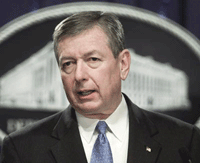 The US government raised its terror threat level to "high risk" orange on Friday, warning of a growing possibility that the al-Qaida network would launch an attack against the United States to coincide with Muslim holy days.
The US government raised its terror threat level to "high risk" orange on Friday, warning of a growing possibility that the al-Qaida network would launch an attack against the United States to coincide with Muslim holy days.
Changing the terror alert color from "yellow" triggered tighter security at borders, airports and hotels. Officials also urged greater vigilance by all Americans.
Attorney General John Ashcroft said the government had received intelligence information, corroborated by multiple sources, that Osama bin Laden's terror organization sought to attack Americans at home or abroad during the time of the annual hajj pilgrimage to the holy Saudi city of Mecca. The five-day hajj involving tens of thousands of Muslim pilgrims begins Saturday.
The intelligence indicates that al-Qaida operatives might attempt to attack "soft" or lightly guarded targets such as apartment buildings and hotels and that such attacks could involve chemical, biological or radiological devices. Officials have been particularly concerned about the use of a so-called "dirty bomb" that could spew radiation over a relatively confined area, but there was also the possibility of conventional explosives or even assassinations.
Ashcroft said there are indications that al-Qaida "might also seek economic targets, such as transportation and energy sectors, as well as symbolic targets and symbols of American power." Al-Qaida is blamed for the Sept. 11, 2001, attacks in New York, Washington and Pennsylvania that killed over 3,000 people and brought down the World Trade Center's twin towers.
"It's their intention to do what they can to disrupt free people and destroy the values for which America stands and which it represents so prominently to the world," Ashcroft said.
A few hours after the announcement, the FBI issued an alert to law enforcement and the public for help in finding a Pakistani man identified as Mohammed Sher Mohammed Khan, 36, who it said may have entered the United States illegally after Sept. 1, 2001. The FBI said it had no specific information that Khan was a terrorist -- his name and birth date might be fictitious -- but that agents want to question him.
An FBI official, speaking on condition of anonymity, said Khan was not the reason the terror alert level was raised but that he was "one of a number of factors."
The US military buildup for possible war with Iraq was a lesser factor in the decision to raise the threat level, several officials said. "There's absolutely no connection," said Homeland Security Secretary Tom Ridge.
But Rep. Dennis J. Kucinich, D-Ohio, a leading congressional opponent of war with Iraq, said the change in alert level provided evidence that "this march to war, far from making our nation more secure, has raised the threat to Americans."
Ashcroft announced the change, which had been debated by senior officials for several days, at a Justice Department news conference along with Ridge and FBI Director Robert Mueller. Beginning March 1, Ridge will have authority to make these announcements as part of the law creating the new Homeland Security Department.
They gave no specifics about the method, timing or location of a possible attack. But a high-ranking law enforcement source in New York, speaking on condition of anonymity, said intercepted communications appeared to pinpoint New York as a target, raising specific concerns about hotels and subways in city and elsewhere on the East Coast.
The decision to raise the threat level was approved earlier in the day by President Bush during an Oval Office meeting with Ashcroft and Ridge, who had been going over new intelligence in the White House situation room.
"I agree. Change the code," Bush was quoted as saying by spokesman Ari Fleischer.
Orange is the second-highest alert level on a five-point scale of risk developed after the Sept. 11 attacks. The level was last that high in September and stayed there for two weeks to coincide with the first anniversary of the attacks. The highest alert level is red, which signals an imminent attack.
The change in status triggers such actions as greater scrutiny of airport baggage, enhanced identification checks at buildings, tighter examinations of travel documents and vehicles at US borders, Ridge said. He told many of the nation's governors about the threat in a conference call Friday and was also briefing members of Congress, mayors and other officials.
Ridge called upon individual Americans to "remain aware and remain alert" and to take actions such as devising a family communication plan to stay in touch in case of an emergency.
"Each of us in our own way can contribute to the security of our nation, our families, and our communities," he said.
Government leaders said there was no need to cancel public events or alter work or travel plans. The State Department, however, issued a worldwide alert Thursday for Americans overseas about the threat, warning of the possibility of suicide bombings, kidnappings or assassinations.
The FBI was providing some details about the threat increase to some 17,000 police agencies nationwide and to its Joint Terrorism Task Forces -- made up of federal, state and local law enforcement personnel -- across the country. Ridge also talked with business leaders who run the nation's key infrastructure, such as electric power grids, dams, financial networks and transportation systems.
Government officials have grown increasingly concerned about the likelihood of terrorist attacks within the United States as intelligence sources are reporting an increase in terrorist activity or "chatter." One official said this activity was rivaling that seen before the Sept. 11 terror attacks.
(China Daily February 8, 2003)
|

